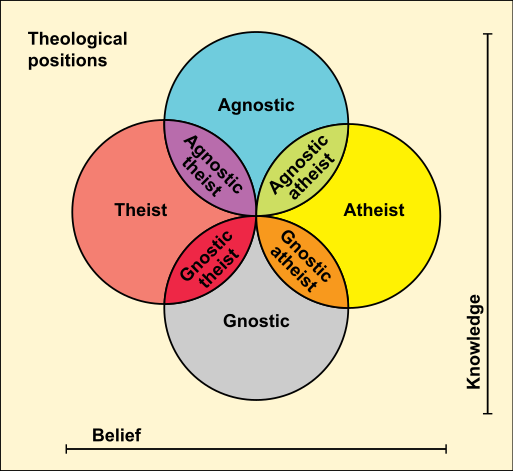Definitions and Terms
| URL | Description |
|---|---|
| Agnosticism | Agnosticism is the view that the existence or non-existence of any deity is unknown and possibly unknowable. More specifically, agnosticism is the view that the truth values of certain claims—especially claims about the existence or non-existence of any deity, as well as other religious and metaphysical claims—are unknown and (so far as can be judged) unknowable. Agnosticism can be defined in various ways, and is sometimes used to indicate doubt or a skeptical approach to questions. In some senses, agnosticism is a stance about the difference between belief and knowledge, rather than about any specific claim or belief. In the popular sense, an agnostic is someone who neither believes nor disbelieves in the existence of a deity or deities, whereas a theist and an atheist believe and disbelieve, respectively. In the strict sense, however, agnosticism is the view that humanity does not currently possess the requisite knowledge and/or reason to provide sufficient rational grounds to justify the belief that deities either do or do not exist. |
| Anthropomorphism | Anthropomorphism, or personification, is attribution of human form or other characteristics to anything other than a human being. Examples include depicting deities with human form and ascribing human emotions or motives to forces of nature, such as hurricanes or earthquakes. |
| Deism | Deism is a theological position concerning the relationship between "the Creator" and the natural world. Deistic viewpoints emerged during the scientific revolution of 17th century Europe and came to exert a powerful influence during the eighteenth century enlightenment. Deism stood between the narrow dogmatism of the period and skepticism. Though deists rejected atheism, they often were called "atheists" by more traditional theists. There were a number of different forms in the 17th and 18th century. In England, deism included a range of people from anti-Christian to un-Christian theists. |
| Exegesis | Exegesis (from the Greek ???????? from ?????????? 'to lead out') is a critical explanation or interpretation of a text, especially a religious text. Traditionally the term was used primarily for exegesis of the Bible; however, in contemporary usage it has broadened to mean a critical explanation of any text, and the term "biblical exegesis" is used for greater specificity. |
| Gnosticism | Gnosticism (from gnostikos, "learned") is the dualistic belief that the material world should be shunned and the spiritual world should be embraced. Gnostic ideas influenced many ancient religions which teach that gnosis (variously interpreted as enlightenment, salvation, emancipation or 'oneness with God') may be reached by practising philanthropy to the point of personal poverty, sexual abstinence (as far as possible for hearers, total for initiates) and diligently searching for wisdom by helping others. |
| The LDS Church Scriptural Canon |
 |
| Theism | Theism, in the broadest sense, is the belief that at least one deity exists. In a more specific sense, theism is a monotheistic doctrine concerning the nature of a god or goddess, and their relationship to the universe. Theism, in this specific sense, conceives of God as personal, present and active in the governance and organization of the world and the universe. As such theism describes the classical conception of God that is found in Christianity, Judaism, Islam, Sikhism and some forms of Hinduism. The use of the word theism to indicate this classical form of monotheism began during the scientific revolution of the seventeenth century in order to distinguish it from the then-emerging deism which contended that God, though transcendent and supreme, did not intervene in the natural world and could be known rationally but not via revelation. |
| Thelogical Positions |  |
| Tithe | A tenth part of one's annual income contributed voluntarily or due as a tax, especially for the support of the clergy or church. |
| Trinity | The Christian doctrine of the Trinity defines God as three divine persons or hypostases: the Father, the Son (Jesus Christ), and the Holy Spirit; "one God in three persons". The three persons are distinct, yet are one "substance, essence or nature". A nature is what one is, while a person is who one is. |